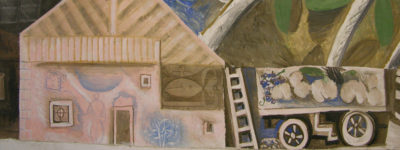Non-binary embodiment: feminist and queer theologies in the re-writing of holy corpo-realities

Online e in presenza
Fondazione Bruno Kessler - Polo delle Scienze Umane e sociali
Aula piccola
Online e in presenza
Fondazione Bruno Kessler - Polo delle Scienze Umane e sociali
Aula piccola
FBK-ISR International Seminar 2023
In the last decades, the Kabbalah and its interpretations have enjoyed an unexpected resurgence in pop culture but, more importantly, in religious discourses of feminist and queer circles interested in alternatives to the cis-gendered Western religious interpretations of biblical texts. However, it is important to stress that theosophical Kabbalah is framed in an extremely heteronormative discourse. Indeed, for the early Kabbalists, the dimorphism masculine/feminine embodied and reflected the process of world maintenance.
The proposed analysis aims at presenting the continuous processes of embodiment and dis-embodiment used by queer and feminist theologians among predominant Jewish Kabbalistic interpretations in order to create safe “theological” narrations for women and non-normative sexualities and genders.
The first reading will focus on the interpretations of Kabbalistic gender dimorphism: how is gender constructed? The second reading discusses the role of yichud, or “unification”, particularly when male mystics take the role of the feminine “sefirah of malchut”, imitating God, who is, via the sefirot, a multi-gendered, trans-gendering deity wearing the masks of different genders at different times and seeking partners.
Scientific coordination: Massimo Leone, Director FBK-ISR
Cycle of seminars: “(Dis)Embodiment in Religion and Ethics”
The presentation will be in-person in the FBK Aula Piccola while seats last and online
Registration by January 20, 2023 at 10:00 a.m. is required in order to arrange the connection
***
Immage:
Affresco di Schweitzer
Speakers
-
Deborah Iannotti - SpeakerFBK-ISRDeborah S. Iannotti is a researcher at the Centre for Religious Studies of the Bruno Kessler Foundation in Trento, Italy, dealing with the relationship between new technologies and religion, particularly the relationship between AI (Artificial Intelligence) and Judaism. Her research interests cover a wide range of interconnected issues between religions and nationalism, religious diasporas and the protection of religious minorities, theoretical paradigms in the study of religions, and processes of decolonization of religious discourses, with a focus on the relationship between gender and religion and intersectional theory.
Registration
Registration to this event is mandatory.
Registration closed on 20/01/2023.